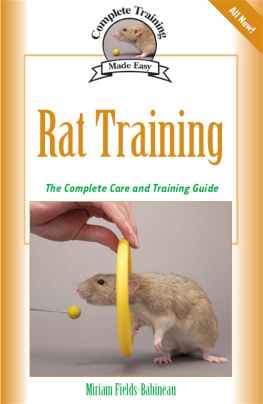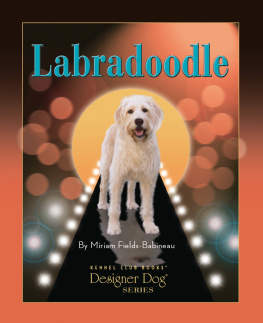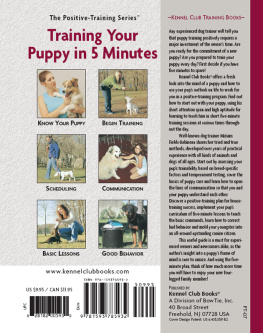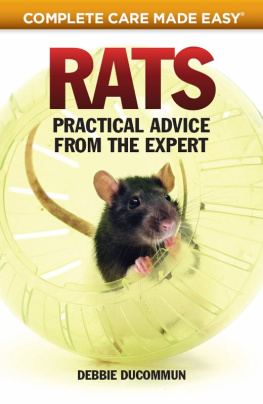
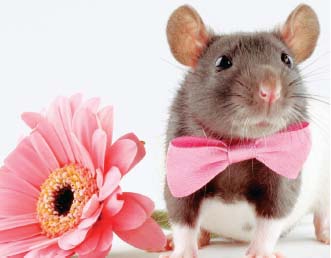
When you are looking for a prospective pet, first impressions count.
B EFORE YOU WELCOME A RAT INTO YOUR HOME , make sure you and your chosen pet are right for each other. Your choice of a rodent instead of the more common cat, dog, or bird should be based on a good understanding of rats social, practical, and veterinary needs, which may be more like those of other housepets than you think. Rat ownership is sure to be more fun and more successful if you plan ahead and can answer yes to the following questions: Do you want an active, interactive pet with loads of personality? Do you have at least a half hour (and preferably a couple of hours) each day to care for and play with your rat? Are you prepared to regularly clean the cage and do occasional rodent refuse duty? If you are an adult in a household with young children, will you be there to supervise their interactions with the new pet? Have you made sure no one in your home is allergic to rodents?
So many questions!
If youre reading this book, chances are youre already hooked on rats and have set out to learn as much as you can. Kudos to you! That also means a few of you are willing to rule out rat ownership. For example, if you werent expecting to clean your rats cage at least once a week and pick up his droppings when hes out for a stroll around the house, rat keeping is probably not for you. If you intend to buy a rat to give your children a pet that will be easier to tend than other animals, youll find that rats do not make good pets for small children, who are too young to understand proper handling or rough play. Dont expect to turn over rat care to youngsters. The responsibility for your pets care and safety is yours alone, and you should be available to supervise all encounters between your rat and the children in the house to prevent unfortunate mishaps for all involved. Finally, if you think a pet rat will be less likely to cause allergic reactions than other animals, youll find that people with allergies may react to an adult rat even if handling a baby rat (known as a pup or a kitten) doesnt bother them.
If youve done your homework and decided that you are ready to handle the responsibility, congratulations! Youll be welcoming a responsive, intelligent, trainable pet into your home.
Finding the Perfect Rat
Rats are often an impulse purchase. Unfortunately, as with any impulse purchase, the interest in the animal can quickly fade, leaving the rodent to a solitary life with little stimulation, or worse. Dont give in to the impulse; advance planning will benefit all parties. To find the perfect rat, check out a few different sources before making your purchase.
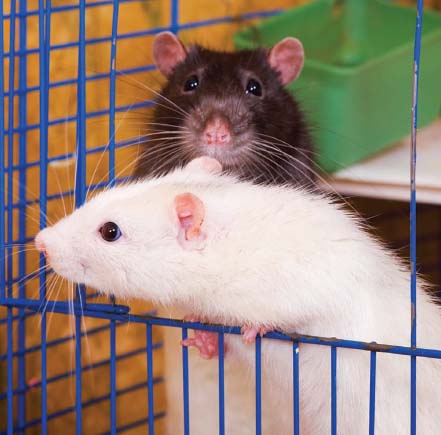
It pays to shop aroundrats of all kinds are available to the persistent, discerning buyer.
Many people go directly to the pet store, as most shops stock rats as reptile food, with a few of the fancy varieties available for sale as pets. (Fancy doesnt refer to a rats appearance; it refers to domesticated rats bred to be owned as pets by rat fanciers.) It is important to ask the pet shop manager where the shops stock comes from; the stocks origins have a huge influence on your pets social skills, health, and longevity.
A pet store can be a good source if the shop buys rodents from local breeders whose animals have been well cared for under good conditions. Other resources well worth investigating include local breeders, animal shelters, and your nearest fancy rat club. Although you will find a wealth of information and contacts online, it is important to exercise discernmenteven a healthy skepticismabout purchasing animals sight unseen. Always try to meet with sellers and ask them questions about their practices.
Evaluating the Prospective Pet
No matter where you select your new pet, a few minutes of careful observation will help you choose a rat that will be both a good companion and easy to train. There are three main things to evaluate: the rats environment and diet, the rats health, and the rats reaction to human contact.
Simply looking at the rats environment will tell you a lot. Sellers who care about the welfare of their rats will keep their cages clean and provide some climbing apparatuses and toys. The food bowl will contain healthy foods such as lab cubes (also called lab blocks) or seed mixture, and the bedding will be soft, absorbent, and ink free. There will be little if any odor. Rats constantly groom themselves and one another. They dont like to live in filth. A dirty environment jeopardizes the animals wellbeing and comfort; a clean environment promotes good health.
There are a few other things to look for in evaluating the health of the rat. First, make sure that no individual in that rodent colony is sneezing. Take a couple of minutes to listen to the rats. If you hear one sneeze, rule out the entire colony. Respiratory infections are highly contagious and often fatalif one rat shows symptoms, you can be certain the infection has already spread. Dont waste your money.
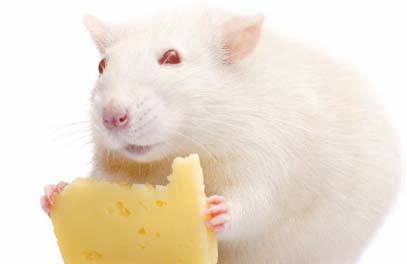
Obesity can be a sign of overfeeding or a hormonal imbalancein any case, be wary.
Second, in general, dont choose an overweight rat. Healthy rats fed a healthy diet are fairly active and normally do not get fat. A rat that is overweight and lethargic might be sick. There is one exception to this general advice. Rats surrendered to a local animal shelter or humane society for adoption are more often overweight than fit because their previous owners have not had time to interact with and stimulate them. You can still adopt these pudgy pals, though, and help them gradually get back into shape through exercise.
Always take some time to evaluate the social behavior of a rat that captures your interest. Rats are curious by nature and normally move around more once theyre removed from a cage. Well-socialized rats are rarely still when taken to a new place or when being held by a new person. Try to engage the rat youre interested in with food or activity. Hold him for a while and see whether attention is all he needs to become more active and responsive. Hold him against your chest and listen closely for any wheezing sounds. These could be another sign of possible respiratory infectionin this case, move on.
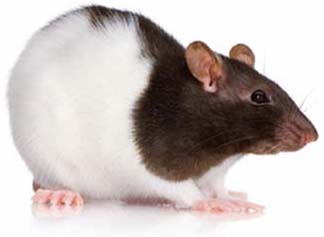
With his dark head and striped back, the Hooded rat offers a striking alternative to the common Albino rat.
Although rats are social creatures and prefer one anothers company, it takes frequent handling by humans, starting at a very young age, to make them comfortable with their two-legged family members. You can generally gauge how much a rat has been handled by how it reacts when you reach into the cage and place your hand on the floor. A rat that runs in the opposite direction and hides in his house is a rat that wants nothing to do with humans. Perhaps he has been been picked up by his tail or otherwise handled roughly; perhaps he is merely unfamiliar with the presence of a big hand and wants nothing to do with it. Proceed with caution: an unsocialized rat may bite, and thats the last thing you want your pet to do.
Next page
